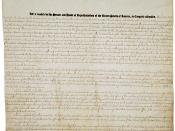Political parties are organized for various reasons, such as: to support a particular political figure, to advance a particular policy or a general ideological stand, to aid politically certain groups or sections of society, or merely to combine for short-term political advantages. From the beginning of the United States, groups such as the Tories, Whigs, Federalists and the Anti-Federalists, have been active, supporting various ideas or plans. The Tories, who were pro-Britaish before the American Revolution, and the Whigs, those who were Pro-American before the American Revolution, were of the earliest groups organized to support a certain cause or idea. Next the Federalists and Anti-Federalists emerged, alternating supporting and obstructing the ratification of the Constitution. During Washington's presidency dominant political parties were unknown, but during his second term the emergence of the Hamilton Jefferson rivalry began to. Washington worked to maintain neutrality, but the coming of two dominant political parties appeared close on the horizon.
The 1790s were a turbulent period both at home and abroad, and the conflicts that arose laid the foundation of the two-party system in the United States.
Domestically, the economic programs of Alexander Hamilton generated fervent opposition from Thomas Jefferson, a Democratic-Republican or "Jeffersonian". Through Jefferson and Hamilton's economic and political opposing views, the emergence of dominant political parties arose. Hamilton, a strong Federalist who was Washington's Secretary of Treasury, brought forth many proposals to solve the new nation's national debt problems. Subsequently, Thomas Jefferson strongly opposed Hamilton's resolutions and plans. First, Hamilton wanted the national debt to be funded at par, which would allow the infant national government to gain respectability and prove their validity and authority. Hamilton persuaded Jefferson to gather votes for his financial plan if "in return, Virginia would have the federal district on the Potomac" (Bailey 186). Next, Hamilton wanted...



Excellent
This essay in my opinion was excellent and easy to read. Thank you really. It helped me alot
5 out of 5 people found this comment useful.